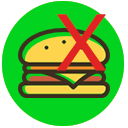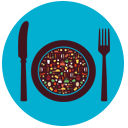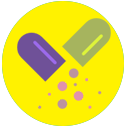- Home
- blood sugar levels
- level 200-250 after eating
Blood sugar level 200-250 mg/dl
(11.111.1–13.8 mmol/L) fasting, after eating, drug-induced
|
A blood sugar level of 200–250 mg/dl is considered diabetes. If you have such an increased glucose level, you should immediately start anti-diabetic treatment. You should understand how your sugar levels change depending on the time you get the test. |
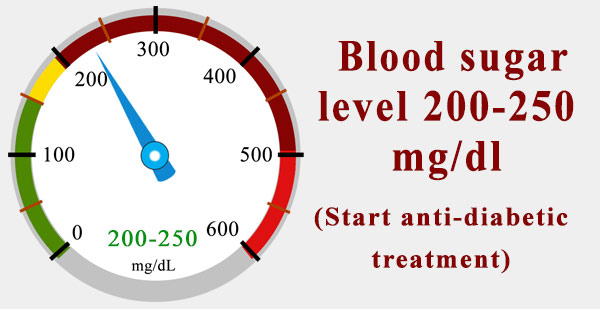 |
Causes of Blood Sugar Levels 200–250 mg/dl
Yes, it is true that when you find such high blood glucose levels, most probably you have diabetes. However, there are other factors causing such high levels.
Drug-induced blood sugar levels of 200–250 mg/dl may be secondary to the use of some drugs, such as Thiazines, beta blockers, statins, steroids, antipsychotics, immunosuppressive agents, pentamidine, nicotinic acid, etc.
Other causes include an increase of insulin resistance, an increase to the affection of insulin secretion, or both.
When your blood sugar was tested...
High blood sugar levels (200–250 mg/dl symptoms
The symptoms are those related to diabetes. The most common ones include:
- increased urine output,
- increased thirst,
- unusual weight loss,
- blurred vision,
- unusual fatigue, etc.
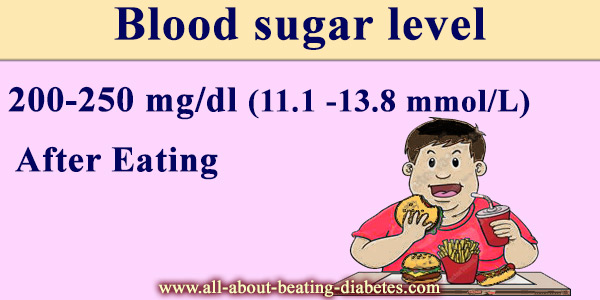
The symptoms might not be notable when only high blood sugar is found after eating. Unless, the test is done. However, it remains the fact that dry mouth is commonly reported among the patients.
It is quite normal for blood sugar levels to rise after eating. The increased levels of glucose trigger the insulin production and secretion by the pancreas. This is a compensatory mechanism, in order to neutralize the increased glucose.
Usually, the release of insulin takes place within 10 minutes after eating. The insulin removes glucose from the bloodstream to the cells where it is used as an energy source.
In diabetic people, the blood sugar levels remain elevated for a longer period of time because of the body’s inability to produce and utilize insulin properly. This way, the levels of glucose after a meal can reach 200-250 mg/ml or even more.
When the blood glucose is spiking due to the use of some medications, this increase will be noted a few hours or days of using the drugs. The symptoms might include only unusual fatigue or frequent urination, or dry mouth reported by patients.
The Best Treatment Strategy for high blood sugar levels of 200–250 mg/dl
Your primary therapy will be drug therapy, which may include the use of oral antidiabetics or insulin, as your doctor will advise you.If left untreated, it will predispose to heart, brain, kidney and eye issues, among many other problems.
But, When you are diabetic, lifestyle changes do matter a lot. They are a very important
part of diabetes treatment.
The lifestyle changes you need to do are as following:
1. Drink plenty of water - this will help clean your bloodstream from excessive sugar.
2. Think what have you eaten to cause high blood sugar levels? Try to eliminate as much as possible high carbohydrate foods, fat, and foods rich in calories.
3. Physical activity after eating - Not only it decreases your glucose levels, but it also improves blood circulation and decreases fat levels in your bloodstream. These changes delay the long-term complications of diabetes.
Try mild exercise (e.g. short walking, shooting hoops, clean up the kitchen, ping-pong) 10 or 15 minutes after eating, this will avoid spikes in blood sugar levels after eating.
When the increase in blood sugar is induced by some drugs, stop using them immediately and consult with a doctor about whether you need to start using anti-diabetic drugs for a while, or not.
Blood sugar levels: 200-250 mg/dL: - Prevention
Conducting a healthy lifestyle is the key to preventing spikes in blood glucose.
Paying attention to the foods and drinks you consume is another preventive measures. You should not consume foods/drinks with high calories that you can't burn. In other words, should use what your body needs as per your daily physical activities.
Should not use the drugs that cause your glucose levels to rise again. If you must use these drugs, consult with your doctor first. He might come up with a plan to avoid your glucose levels to rise while using this drug. This includes a temporary anti-diabetic treatment, and of course, lifestyle and diet changes.
Written by Dr.Albana Greca Sejdini, Md, MMedSc
Medically reviewed by Dr.Ruden Cakoni, MD, Endocrinologist
References
- ADA Blood Glucose Chart
- What Diabetes Feels Like?
- Treatment for High Sugar Levels
- Drug induced Diabetes
Diabetes complications Questions or Problems? Get Help Here
This is the place where you can ask a question about any aspect of diabetes complications.
It's free and it's easy to do. Just fill in the form below, then click on "Submit Your Question".
